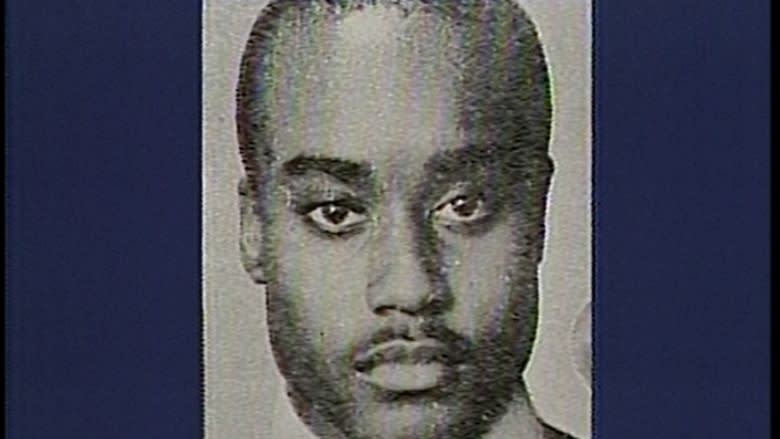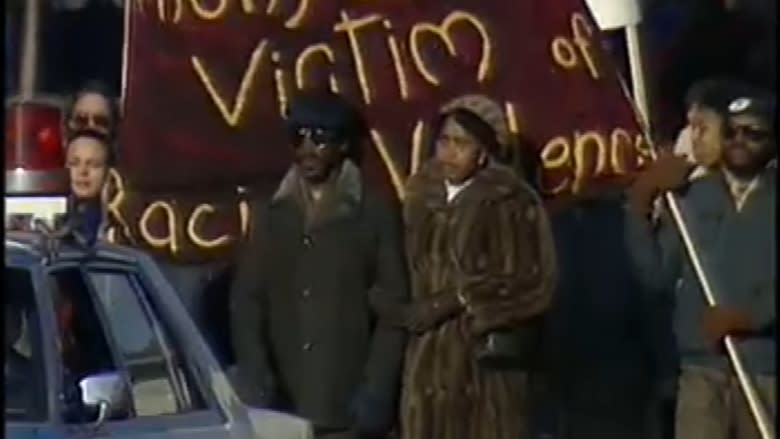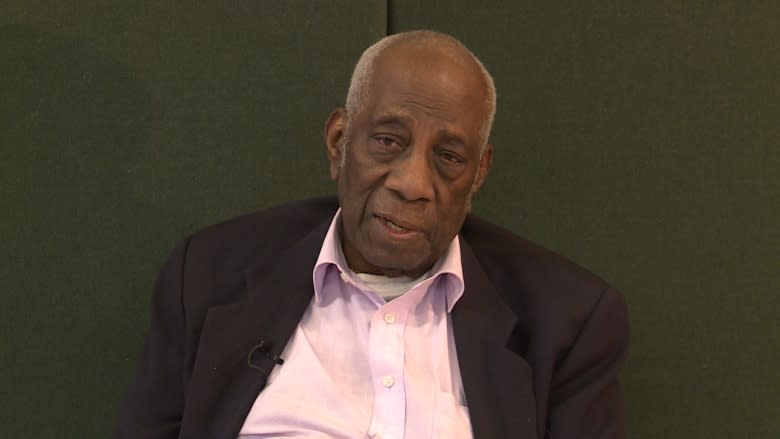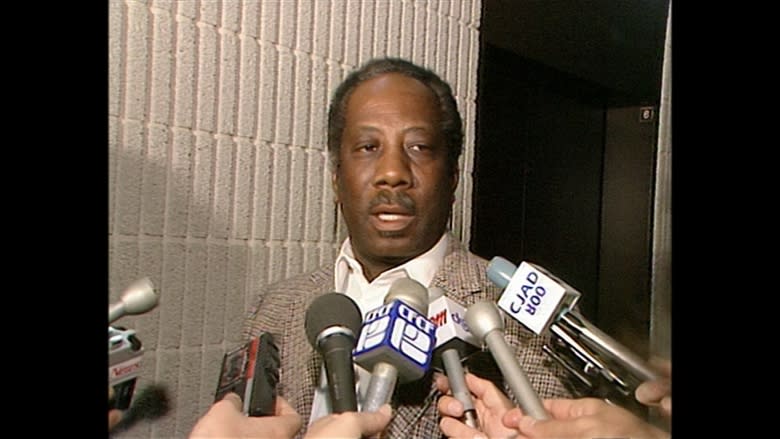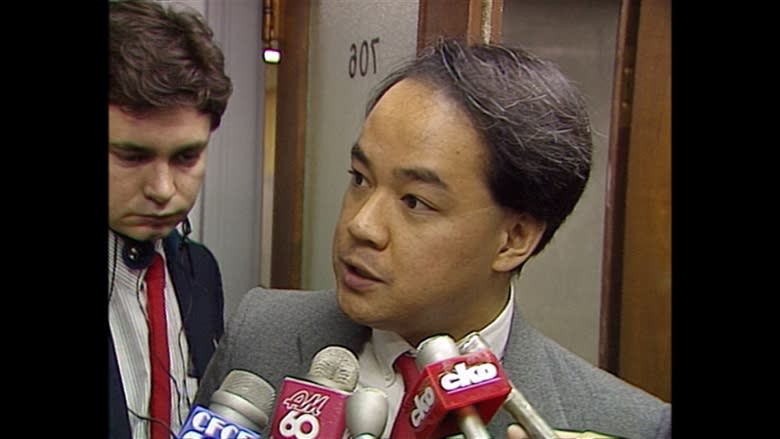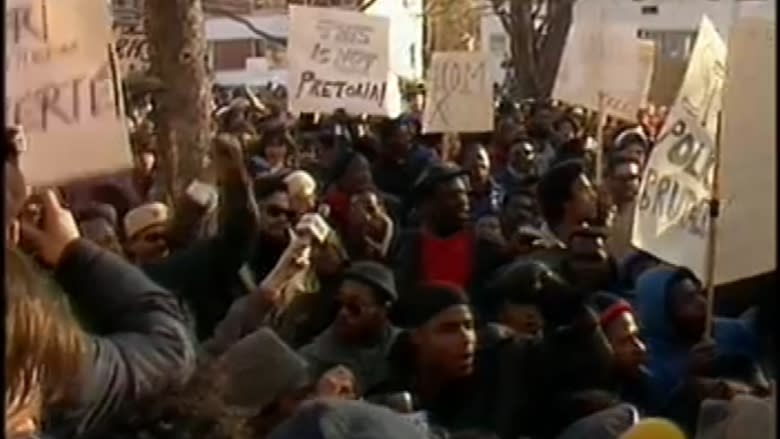Anthony Griffin's death sparked an uprising in Montreal, but police still have work to do
In the days, weeks and months after the death of Anthony Griffin, they marched. And they marched.
Members of Montreal's black community, outraged that a young black man could be fatally shot in the head while complying with a police order, wanted answers. They wanted justice. They wanted change.
Griffin, just 19, died 30 years ago today — Nov. 11, 1987.
His death was a lightning rod and ushered in a new era of relations between multi-ethnic communities and Montreal police.
Most say there were changes for the better. But 30 years later, many in the black community wonder if those changes have stood the test of time.
Even before Griffin's death, Montreal's black community was pushing for change.
Two years earlier, in 1985, the fledgling Centre for Research-Action on Race Relations (CRARR) released a scathing report on relations between the Montreal Urban Community police and visible minorities in Montreal. It pointed to the frequency of news coverage of incidents of racism and police brutality directed at black Montrealers.
It was against this backdrop that the black community mobilized to rally against what they perceived as Griffin's cold-blooded murder.
Bellemare inquiry came fast
With thousands protesting in the streets, Montreal's authorities acted with uncharacteristic speed, calling an inquiry into the relationship between police and racialized communities within two weeks of Griffin's death.
That inquiry, led by lawyer Jacques Bellemare, resulted in 70 recommendations, among them:
-
Increasing the number of police officers from racialized and visible minority groups to reflect the Quebec population.
-
Giving officers cultural sensitivity training.
-
Taking care in police publication of crime statistics, acknowledging they do not tell the whole story, to avoid reinforcing prejudices and stereotypes.
-
Evaluating the performance of patrolling officers based in part on their behaviour in situations involving racialized and visible minorities.
'Many Anthony Griffins'
"We felt like we could change the system," said Dan Philip, the president of the Black Coalition of Quebec then and now, and a key activist in the campaign for improving the relationship between police and black Montrealers.
"Change has come about, but at a very slow pace."
Philip said many of the Bellemare recommendations were ignored, and even with the positive changes, after 1987 "there were many Anthony Griffins."
"We think of Marcellus François, Richard Barnabé, Martin Suazo — and I can go on and on." Philip said, listing men from visible minorities who all died "under circumstances that could be avoided."
"They should be alive today. And it just shows the negligence and the way that police treat people with a sense of no value, and that they can do that with impunity."
Racism in police ranks, still
CRARR founder Fo Niemi had a front row seat at the Bellemare inquiry called after Griffin's death: his research group was the first to present, calling for the pressing need for social change.
"The mayor at the time and every person in authority started to feel the heat for answers, for accountability and for concrete action against the officer, against the Montreal police," he said.
Niemi said Griffin's death, and then the shooting death of Marcellus François five years later, kept that pressure on the authorities, and to his credit, then-police chief Rolland Bourget tried to make the changes that were recommended following the commission.
"He understood the need for change and a need for greater diversity and reflection of the community in which the police had to work, and he appointed the right people," Niemi said.
"He put in place the right resources in order to produce the results that we see to a certain extent in many ways today."
Increasing diversity in the police force was a key recommendation in the Bellemare report and in subsequent commissions, and while Niemi says there has been a vast improvement, racism in the ranks is still a problem.
"There are more than several hundred black, Asian and Arab police officers, some of whom have started to move into positions of sergeant and even commander, rising to the top," Niemi said.
"We still see, however, a certain degree of resistance to the notion that racism does exist, that racial profiling does exist," he said, adding that that resistance is institutional and translates into "denial of the need to do something to prevent it from happening again."
Niemi said back in 1987, the various groups that participated in the Bellemare inquiry were buoyed by the "mini social revolution" brought on by the adoption of the Canadian Charter of Rights and Freedoms in 1982.
However, he said, following the 1995 sovereignty referendum, many community groups, particularly in the English-speaking black community, disappeared or shifted their focus away from advocacy work.
"The word advocacy, since the mid-90s up until today, has become almost a dirty word. And that's why a lot of these changes have basically become invisible or ineffective."
'If you ask for backup, nobody will go help you'
Jean-Robert Milord was a police constable in 1987, when Griffin was shot — one of the first black police officers to be hired in Montreal.
It wasn't easy.
"The guys treat you like you are a stranger, like you come from another planet."
As a black man, he understood what it was like to face discrimination and oppression. But as a police officer, he knew he and his colleagues had to have each others' backs.
He felt like he needed to be careful and show his solidarity for both sides.
The way he chose to do that was through restraint.
"Try to think twice before you talk. If you have a doubt in your head, I just prefer to say nothing and just shut up," Milord recalled. "You know, that's the way it was."
Milord made a conscious decision to testify at the Bellemare commission, and when his colleagues found out, he found that police solidarity eroded.
"I received a call, an officer told me, 'If you have problem at night, if you ask for backup, nobody will go help you,'" he said.
By the time Milord retired in 2009, he witnessed a lot of changes - the hiring of more black officers, mandatory cultural sensitivity training — but he saw the pushback, too.
"People don't change from one day (to the next).... It takes a lot of things."
Milord eventually rose to the rank of detective sergeant, but it took many years. He said he paid a price in order to open doors for today's officers of colour.
He knows they are probably fighting their own battles, but he said those battles aren't as fierce as they once were.
"The mountain was very high at the time. It's not a joke. It was very high."
A measure of success
André Durocher was also on the force at the time of Griffin's shooting and now serves an inspector with the police communications division.
Durocher said even if more work needs to be done to attract more visible minorities into the police force, the changes over the last 30 years have had an impact on the Montreal police service.
"You can measure it in pure statistics, or you can measure it in terms of success," he said.
"To me, success is when you have people of various cultures on a working group, and people don't notice it."
Durocher says he has seen progress, and shifts in the attitudes of everyone on the force.
"Officers that we've had that are minorities, throughout the years have changed us, and we've changed them, and that's what I call real integration."
Was Griffin's death in vain?
Many black Montrealers who marched in the street to protest against Anthony Griffin's death 30 years ago point to that event as a major catalyst for change.
But they say there is still a long way to go.
"Thirty years later, what we asked for is realized — in a quasi way," said Black Coalition of Quebec president Dan Philip. "The jury is still out on it."
"Many people have died, and we refer to Anthony Griffin often. But the changes that I expected as a result of his death have not come about."
CRARR's Fo Niemi doesn't disagree with Philip.
However, he does believe that Griffin's legacy is that he changed the Montreal police service for the better.
"Ultimately, Anthony Griffin sent out the signal through his death that the battle for racism has to go on at every level of society and every level of decision-making, because a change has to start at the top."
This week, on the 30th anniversary of Anthony Griffin's death, CBC Montreal is presenting His name was Anthony: the life and death of Anthony Griffin and how he changed a city.
The series explores how the fatal police shooting galvanized Montreal's black community and led to changes in policing in multiethnic communities.
Part 1: His name was Anthony: Friends remember Montreal police shooting victim 30 years later
Part 2: The key moments that followed the day Anthony Griffin was shot
Part 3: Overnight activist: How Anthony Griffin's death changed 1 woman


